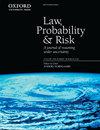工具性法律分析的局限性与前景
IF 1.4
4区 社会学
Q1 LAW
引用次数: 0
摘要
法律应该被理解为服务于外部社会目标,还是作为一种不可减少的道德重量的承担者?这个问题一直是当代激烈争论的话题。一种传统认为,法律规则应该根据其对某些外部的、通常可量化的价值所产生的后果来评估。这种方法的成功引起了强烈的反对,一些学者断言,法律是规范的独特的人与人之间关系的堡垒。在这种观点下,法律规则的意义不能被充分衡量,法律也不能被适当地强迫为某些外部目标服务。尽管存在这种反弹,但毫不掩饰、毫不妥协地将法律视为工具的做法仍然很盛行。埃里克·波斯纳和格伦·魏尔的《激进市场:为公正社会铲除资本主义和民主》和w·基普·维斯库西的《为生命定价:建立更安全社会的路标》提供了工具性法律分析的两个有力实例。这两篇文章都建立在强有力的方法论承诺之上——波斯纳和魏尔的拍卖理论,维斯库西的统计寿命价值(VSL)——而且都建议进行大胆的改革,有利于作者所青睐的外部利益。然而,对这些有影响力的文本的分析揭示了它们在多大程度上忽视了法律作为社会和政治秩序内在道德要素的地位。这篇综述文章表明,激进市场和定价生活提出的改革将对法律的规范性完整性和实际后果产生问题,特别是破坏基于理性规范的法律权利的稳定性。这两个文本的提议都潜在地低估和破坏了个人自主权,并削弱了保护这种自由免受国家和其他私人行为者侵犯的权利的能力。此外,关系批判表明,这两个文本在分析上是不完整的,因为它们都假定了法律的规范性特征,而它们没有处理或研究这些特征。这暴露了工具推理和量化作为一般法律改革基础的最深刻挑战:因为它依赖于中介抽象,它本质上不包含规范性辩护。这篇评论文章的最后观察了对这两个文本的哲学假设的质疑如何表明提供这一规范基础所必需的东西。全文可在https://doi.org/10.1111/jols.12238找到本文章由计算机程序翻译,如有差异,请以英文原文为准。
The Limits and Promise of Instrumental Legal Analysis
Should law be understood as serving external social goals, or as an irreducible bearer of moral weight? This question has been a topic of fierce contemporary debate. One tradition argues that legal rules should be evaluated by their consequential effects in service to some external, typically quantifiable value. The success of this approach has produced a robust backlash, with some scholars asserting that law is a normatively unique bulwark of relationships between persons. In this view, the significance of legal rules cannot be fully metricized, nor can law be appropriately pressed into the service of some external goal.
Despite this backlash, unabashed and uncompromising treatment of law as instrument is still going strong. Radical Markets: Uprooting Capitalism and Democracy for a Just Society by Eric A. Posner and Glen Weyl, and Pricing Lives: Guideposts for a Safer Society by W. Kip Viscusi provide two muscular instances of instrumental legal analysis. Both texts are forged in robust methodological commitments – auction theory for Posner and Weyl, the value of a statistical life (VSL) for Viscusi – and both suggest bold reforms that would benefit the authors’ favoured external good. An analysis of these influential texts, however, reveals the degree to which they neglect the status of law as an intrinsically moral element of the social and political order.
This review article demonstrates that the reforms proposed by Radical Markets and Pricing Lives would have problematic impacts upon the normative integrity and practical consequences of the law, particularly by undermining the stability of legal rights based on reason‐giving norms. Both texts’ proposals potentially undervalue and undermine personal autonomy and diminish the ability of rights to protect this freedom from intrusion by the state and other private actors. Moreover, the relational critique shows that the two texts are analytically incomplete, insofar as both presume normative features of law that they do not address or investigate. This exposes the deepest challenge to instrumental reasoning and quantification as a basis for legal reform generally: because it rests upon intermediary abstractions, it does not intrinsically contain normative justification. The review article concludes by observing how interrogating the philosophical presumptions of the two texts could indicate what is necessary to provide this normative foundation.
Full text available at
https://doi.org/10.1111/jols.12238
Despite this backlash, unabashed and uncompromising treatment of law as instrument is still going strong. Radical Markets: Uprooting Capitalism and Democracy for a Just Society by Eric A. Posner and Glen Weyl, and Pricing Lives: Guideposts for a Safer Society by W. Kip Viscusi provide two muscular instances of instrumental legal analysis. Both texts are forged in robust methodological commitments – auction theory for Posner and Weyl, the value of a statistical life (VSL) for Viscusi – and both suggest bold reforms that would benefit the authors’ favoured external good. An analysis of these influential texts, however, reveals the degree to which they neglect the status of law as an intrinsically moral element of the social and political order.
This review article demonstrates that the reforms proposed by Radical Markets and Pricing Lives would have problematic impacts upon the normative integrity and practical consequences of the law, particularly by undermining the stability of legal rights based on reason‐giving norms. Both texts’ proposals potentially undervalue and undermine personal autonomy and diminish the ability of rights to protect this freedom from intrusion by the state and other private actors. Moreover, the relational critique shows that the two texts are analytically incomplete, insofar as both presume normative features of law that they do not address or investigate. This exposes the deepest challenge to instrumental reasoning and quantification as a basis for legal reform generally: because it rests upon intermediary abstractions, it does not intrinsically contain normative justification. The review article concludes by observing how interrogating the philosophical presumptions of the two texts could indicate what is necessary to provide this normative foundation.
Full text available at
https://doi.org/10.1111/jols.12238
求助全文
通过发布文献求助,成功后即可免费获取论文全文。
去求助
来源期刊

Law Probability & Risk
MATHEMATICSSTATISTICS & PROBABILITY&-STATISTICS & PROBABILITY
CiteScore
2.10
自引率
28.60%
发文量
8
期刊介绍:
Law, Probability & Risk is a fully refereed journal which publishes papers dealing with topics on the interface of law and probabilistic reasoning. These are interpreted broadly to include aspects relevant to the interpretation of scientific evidence, the assessment of uncertainty and the assessment of risk. The readership includes academic lawyers, mathematicians, statisticians and social scientists with interests in quantitative reasoning.
The primary objective of the journal is to cover issues in law, which have a scientific element, with an emphasis on statistical and probabilistic issues and the assessment of risk.
Examples of topics which may be covered include communications law, computers and the law, environmental law, law and medicine, regulatory law for science and technology, identification problems (such as DNA but including other materials), sampling issues (drugs, computer pornography, fraud), offender profiling, credit scoring, risk assessment, the role of statistics and probability in drafting legislation, the assessment of competing theories of evidence (possibly with a view to forming an optimal combination of them). In addition, a whole new area is emerging in the application of computers to medicine and other safety-critical areas. New legislation is required to define the responsibility of computer experts who develop software for tackling these safety-critical problems.
 求助内容:
求助内容: 应助结果提醒方式:
应助结果提醒方式:


